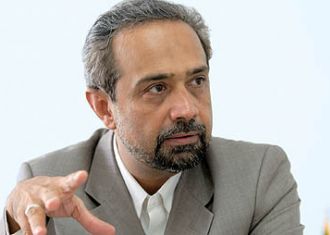November 29 2013

Hamid Moghadam, CEO and chairman of Prologis, has been named National Entrepreneur Of The Year for his ability not only to anticipate developing market trends, but also to respond to them.
The award is presented by EY, the name for the collection of Ernst & Young organizations around the world.
The EY award says it is designed to encourage entrepreneurial activity and recognize leaders and visionaries who demonstrate innovation, financial success and personal commitment as they create and build world-class businesses.
Moghadam was selected by an independent panel of judges from more than 250 regional award recipients.
Bryan Pearce, EY Americas Director, said of Moghadam and Prologis, “Entrepreneurship is embedded in this industrial logistics real estate firm’s DNA by design. Moghadam created a decentralized structure that allows his company to combine a global reach with a strong local presence—and to give back to communities all over the world.”
Moghadam has guided Prologis through three decades of sometimes turbulent economic conditions. In 2011, as CEO of AMB Property Corporation, he merged with his former competitor to form the company that now ranks as the world’s largest owner, developer and operator of industrial logistics real estate. Assets have tripled since the merger.
Moghadam grew up in Iran. “My father was in the real-estate development business,” he said, “and I grew up walking sites and smelling concrete. I knew from a very early age I wanted to be an entrepreneur, a principal and in the real estate business.”
He came to the United States to get an engineering degree at the Massachusetts Institute of Technology. “Afterward I was ready to go back to Iran. But that was around 1978 and there was the Iranian revolution, which made it difficult for me to return. So I went to business school at Stanford.”
He successfully anticipated the collapse of the office building market in the late 1980s. Recognizing that changing demographics, combined with overbuilding in office complexes, would lead to soaring vacancy rates, he redirected his firm’s investments to focus on industrial parks and shopping centers. That decision positioned AMB to thrive during the 1990s.
“I won’t pat myself on the back for being smarter than other guys. We acted on what we saw,” Moghadam said. “It’s not just the ability to see trends, but the courage to do something about it. Many people, when faced with evidence that doesn’t fit their thesis, stick their head in the sand.”
Moghadam also moved against conventional wisdom when he began buying distribution facilities near global trade hubs — seaports, international airports and large metropolitan areas — while other real estate companies were building warehouses in low-cost areas. Moghadam failed to see the wisdom in building storage facilities in low-cost areas far removed from major population centers. So, AMB focused on acquiring distribution facilities and cargo buildings in major cities close to global trade centers.
AMB also pursued an alternative strategy with rapid growth markets in Brazil, Mexico and China, where the company aggressively developed facilities to store and deliver consumer products to the rapidly expanding middle classes in those countries.
Moghadam is also a strong supporter of his cultural heritage, establishing an Iranian Studies program at Stanford and co-founding the Iran Democracy Project at the Hoover Institution.






















